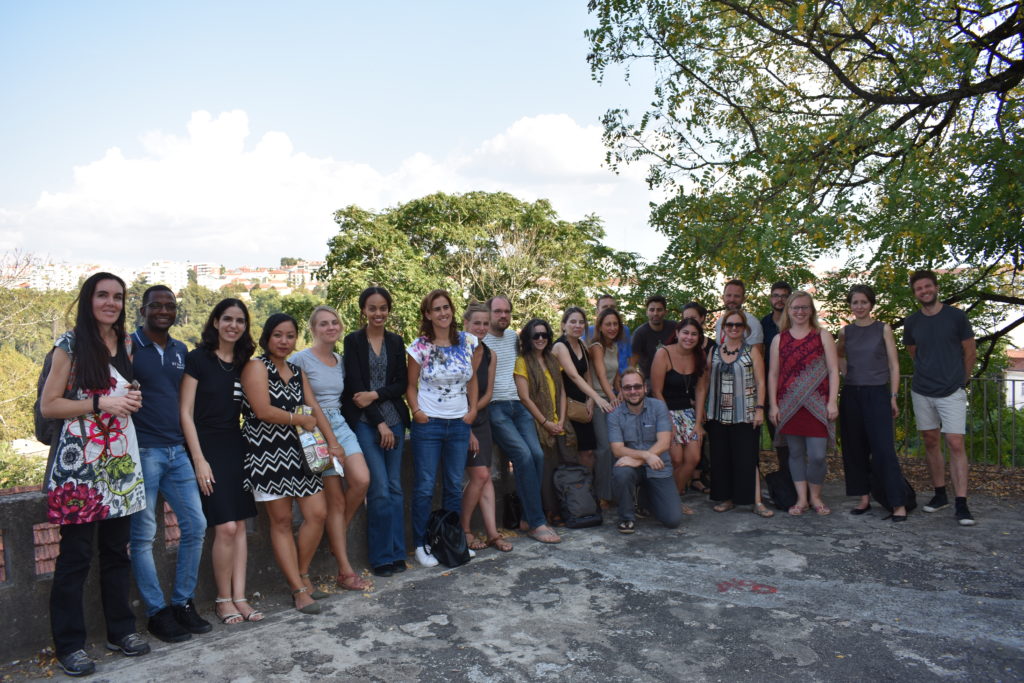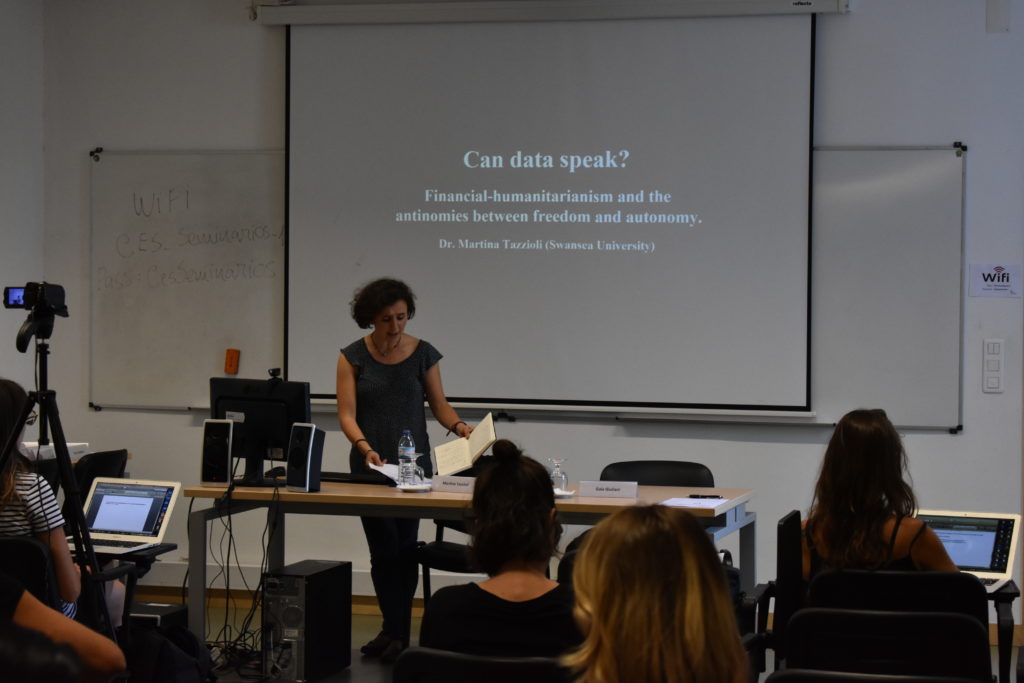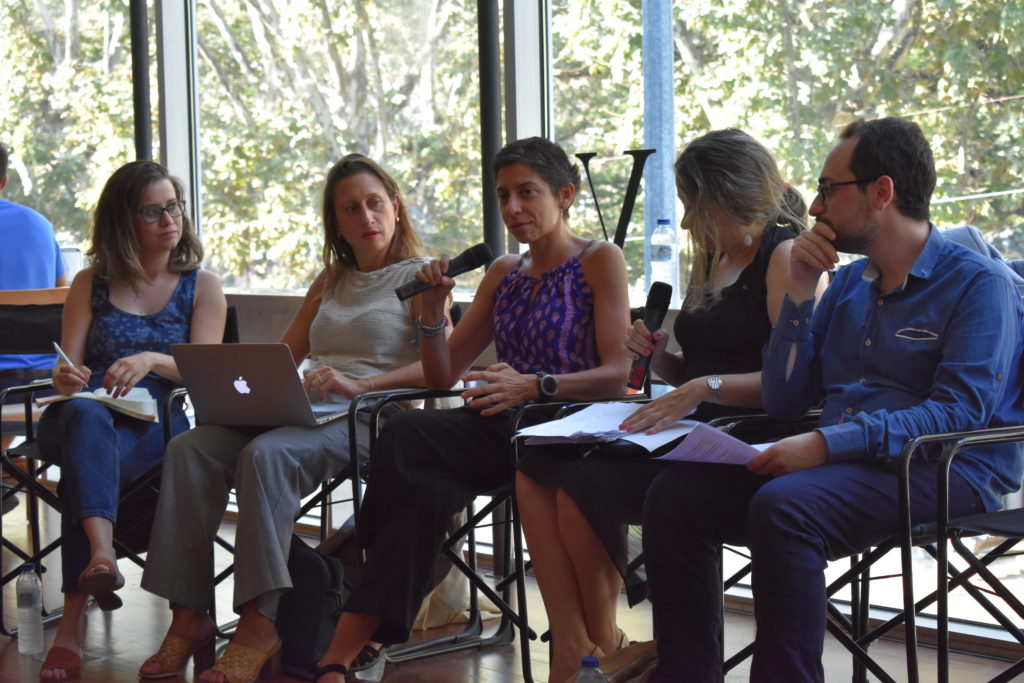In September 2018 the Centre for Social Studies (CES), University of Coimbra, Portugal held a workshop entitled ‘How can STS help to reflect on the political crisis associated with migrants, refugees and asylum seekers?’ An international group of scholars from STS, migration and border studies met to explore the benefits and limitations of using the analytical and methodological repertoire of STS to understand the ongoing political and social migration crises. Here, the organizers and participants write together and argue that it is necessary to tap into the full potential of STS as science and intervention to contribute to engaging with the sociotechnical and epistemic aspects of forced migration and displacement, resettlement, (re)integration, inclusion and related debates and practices.
Since at least 2015 and the so-called ‘summer of migration’, the term ‘crisis’ in combination with ‘migration’ has been the political and social hot potato. It has received a lot of scholarly interest from different areas of the social sciences, but surprisingly little from STS. In 2018 workshop organizers and participants of a workshop on ‘How can STS help to reflect on the political crisis associated with migrants, refugees and asylum seekers’ faced the elephant in the STS room and discovered that all the ingredients are in place to do interesting and scholarly and politically relevant research inspired by STS accounts.
The workshop was motivated by a desire to gather together scholars interested in exchanging and articulating suitable research questions and conceptual/methodological STS approaches in order to generate new insights. Considering the multi/interdisciplinary research on the topic already available – most prominently in migration studies or border studies – a driving question was what interesting partnerships could be made between STS and other research traditions, such as urban studies and postcolonial and decolonial studies.

Beginning by highlighting some of the most obvious connections, migration management establishes technologies and infrastructures that invite critical study through an STS lenses. As a substantial example of what infrastructures, and what implicit politics entangled with them, are at stake here, Martina Tazzioli reflected in her key note talk on the data infrastructures and data circuits associated with the implementation of debit cards in refugee camps, and explored the ways in which refugees’ subjectivities have been shaped by this peculiar articulation between financial tools and ‘humanitarian’ rationales. Dealing with the processes of the financialization of refugee governmentality, Tazzioli focused on the Greek context, where the European Union (EU) has implemented the first refugee Cash Assistance Programme in Europe in collaboration with the United Nations High Commissioner for Refugees (UNHCR). She explored how financial tools, together with digital technologies, have been used to control and govern would-be refugees. In a significant concluding interpretation she questioned the nexus between identity and data that humanitarian actors try to establish through the spreading notion of ‘digital identity’, presented as something that both protects and controls refugees at the same time.

Two rather broad technological categories – Biometric Identification Technologies and Information and Communication Technologies (ICTs) – appear particularly relevant in (dis)enablement of migrants to exercise their right to move. Technologies are key instruments allowing simultaneously for political, social and cultural change, as well as new forms of social control. Martin Lemberg-Pedersen and Eman Haioty’s contribution explored the element of social control being exercised with the help of biometric technologies. Based on their case study into the UNHCR´s practice of iris-enrolling refugees, they discussed the ‘humanitarian experimentation’ of technologies on refugee populations. The authors explored some of the consequences of iris-data transformative capacity – such as becoming a suspicious (and a surveillable) body in a digital age and biometrics’ dynamics of racialization – through the concept of the quasi-object (Serres, Latour). Furthermore, the authors argued that biometric technology acts as a tool for neoliberalized displacement governance, by considering refugees as traceable units of credit (of potential labor, consumption, aid delivery) and credit-nodes for an Information Technology (IT) market (security, consultancy and humanitarian actors).
The ambiguities linked to ICTs were addressed in several presentations. Luciana Sotero, Maria Dias and Joana Sousa Ribeiro prompted us to ask whether we were not jumping too fast to the conclusion that ICTs are necessarily beneficial to migrants’ integration. They argued that ICTs might help migrants deal with the negative experiences associated with the breakdown of, what are known in psychology as, personal social networks. However, they also pointed out, ICTs are far from being a panacea: among other issues, they suggested that the fact that migrants now find it relatively easy to stay in touch with their families thanks to ICTs also has the effect of making the creation of new social connections less urgent, raising questions about ICT’s complex relation to social (re)settlement and forced assimilation. Going further, the authors also made a second and, perhaps, more provocative question when they encouraged us to reflect on what meaning of ‘integration’ is being embedded in the ICTs being promoted as part of the EU’s digital inclusion strategy. STS can help by offering concepts and paradigmatic cases on how to unpack normative assumptions built into these EU-funded ICT’s.
In another case study on the role of ICTs, Vasilis Galis and Vasiliki Makrygianni addressed what they call ‘the digital resistance in the Greek territory’ and portrayed the strategies and practices of survival, resistance and counter-movement promoted by migrants living in a state of ‘subversive mobility’ (Cohen et. al. 2017). The speakers argued that the use of ICTs paves the path for collective ‘unbordering practices’ as it creates digital spaces of autonomy and empowerment. ‘Escaping from domination’ practices occur both when migrants communicate among themselves and with people in solidarity. Furthermore, the use of such digital technologies subverts the European hegemonic system, as it [co-]reconfigures migration practices by enacting emancipatory patterns of use, and vice versa. Against this backdrop, the authors analyzed the multidimensional role of ICTs in migratory routes and digital border technologies as persecutory instruments of the border regime.
The two examples on the complex roles of ICTs in the context of migration and border regimes clearly demonstrated the multiple human–non-human relationships at work, and focused on making visible the empowering and disempowering effects of ICTs on migrants.
Like the examples above, other contributions to the workshop also differed with regards to their implicit preferences enacting different versions of the ‘the state’, ‘state borders’ and ‘migrants’.. Their different approaches reflected the various positions in an ongoing discussion in migration studies on so-called ‘methodological nationalism’ (Wimmer and Glick Schiller 2003). Migration research continues to produce a lot of – sometimes critical – work on how migration is governed by states and their technologies, but little work exists on how migrants exert their autonomy as moving subjects and how they claim rights without necessarily depending on representational politics and practices. Critics have problematized the dominance of approaches that take the nation state and nation state borders for granted and thereby contribute to their further naturalization. Taking heed of this criticism, scholars have been putting together a new vocabulary to study migration ‘from below’. The concepts of ‘autonomy’ (Papadopulous and Tsianos 2013) and ‘acts of citizenship’ (Isin and Saward 2010) are important ones coined in this spirit. The discussion on methodological nationalism can be understood as an invitation to reflect on each scholar’s account of migration with an eye to what such a perspective allowed them to see, but also what did it not allow them to see, where such blind spots derive from and, finally, how to overcome these limits.
Yet, taking into account that STS-inspired approaches also produce their own blind spots, overlook some developments and overemphasize others – which likewise should be subject of reflection – such approaches may help to expand and diversify the methodological and analytical repertoire (including that of methodological nationalism) available to study the blind spots of forced migration regimes and border technologies. As an example, we portray here the work of Fredy Mora-Gámez, which opened a rather promising line of inquiry on the intersection between studies on solidarity and STS work around the notion of care in practice (even though he did not himself use the word ‘care’ in portraying his research). Mora-Gámez’s research introduces the notion of infrastructures of solidarity to the study of the everyday struggles of migrants and the role of actor-networks of care. His interest lies in particularly in the material textures and the work that goes into repurposing a rather symbolic piece of material, the life vest. His study looks at the voluntary action of a migrant, Ivan, who repurposes life jackets that are distributed to migrants crossing the Mediterranean. Repurposing vests is represented by the author as transgressive work that allows Ivan to reclaim agency and, while working in the ‘oficina’, to establish ‘social networks’. STS helps Mora-Gámez’s to study the voices usually neglected due to methodological nationalism. Learning to sew – as Ivan did to repurpose the life jackets – is connected to specific abilities of doing and particular networks of care, and these might help those interested in migrant solidarity understand how migrants reconstruct affective relations. Rather than treating the issue as a purely conceptual puzzle to be dealt with by the theoretician, Mora-Gámez encourages us to learn about the different meanings and modes of solidarity from migrants themselves. He does so in line with STS’s calls for generalizing symmetry so as to extend agency to objects and other textures of matter.
Inspired by the workshop contributions, we conclude that STS may contribute in interesting ways to the study of migration and the many related political and social crises discursively associated with it, by:
- Addressing research problems that benefit most from unpacking and problematizing the naturalization processes entangled with migration regimes through classification and infra-structuring processes and ‘de-scribing’ the norms they embed, the ways they ‘configure’ for instance migrants and border practitioners, and the relations of authority they sustain.
- Diversifying the viewpoints of research subjects and including those voices usually silenced and marginalized by the socio-technical and epistemic practices of migration regimes and border technologies. STS calls for experimentation and greater reflexivity in writing that may contribute to the necessary revision of the epistemic and political premises guiding the study of how migration regimes are shaped and impact migrants’ subjectivities.
- Diversifying methodological-conceptual repertoires, for instance, by encouraging researchers to follow actants through chains of translation, or by prompting them to attend to the ordinary methods used to accomplish ‘practical closure’ or the ‘singularization’ of multiple and potentially contradictory assignments of meanings.
In spite of nuances, there is a widely shared understanding in critical migration and border studies that more research is needed on how, in their encounters with border regimes, migrants create new forms of living and disrupt entrenched notions of what it means to be political, and of course on how they resist and appropriate governmental attempts to curb their right to move. STS seems to have lots to contribute here.
The workshop organizers – Nina Amelung, Cristiano Gianolla, Gaia Giuliani, Joana Sousa Ribeiro, Olga Solovova – not only aimed to facilitate the exchange of knowledge, experiences and views inside academia, but also beyond it. In a science café, Mounir Affaki (a refugee and volunteer for the Global Platform for Syrian Students), Cyntia de Paula (Casa do Brasil de Lisboa) and Susana Gouveia (Portuguese Red Cross) discussed questions on what science and technology do to empower migrants and refugees in Portugal, but also what could and should science and technology be doing to empower migrants and refugees in Portugal?

Taking the gathering during the workshop as a first step in building an international community of scholars at the intersection of STS/migration and border studies, several participants indicated that they would be interested in contributing to further capacity building, for instance, by hosting similar events. The workshop organizers will facilitate a joint publication initiative in 2019, as the first follow-up activity.
*This work has received funding from the European Association for the Study of Science and Technology, the European Research Council (ERC) under the European Union’s Horizon 2020 research and innovation programme (grant agreement N.º [648608]), within the project “EXCHANGE – Forensic geneticists and the transnational exchange of DNA data in the EU: Engaging science with social control, citizenship and democracy” led by Helena Machado and hosted at the Communication and Society Research Centre, Institute for Social Sciences of University of Minho (Portugal). Furthermore, it received funding from received funding from FEDER – Fundo Europeu de Desenvolvimento Regional funds through the COMPETE 2020 – Operacional Programme for Competitiveness and Internationalisation (POCI), and by Portuguese funds through FCT – Fundação para a Ciência e a Tecnologia (grant agreement number N. ° POCI-01-0145-FEDER-029997), within the project “(De)OTHERING – Deconstructing Risk and Otherness:hegemonic scripts and counter-narratives on migrants/refugees and ‘internal Others’ in Portuguese and European mediascapes”.
Bibliography
Cohen E, Cohen SA & Li XR (2017) Subversive mobilities, Applied Mobilities, 2(2):115-133.
Isin EF and Saward M (eds) (2013) Enacting European Citizenship. Cambridge: Cambridge University Press.
Latour B (1996) On actor-network theory. A few clarifications plus more than a few complications. Soziale Welt 47(4):369-381.
Serres M (1982) Theory of the Quasi-object. In: Schehr LR (eds) The Parasite, Baltimore: John Hopkins University Press, pp. 224- 234.
Wimmer A and Glick Schiller N (2003) ‘Methodological Nationalism, the Social Sciences and the Study of Migration: An Essay in Historical Epistemology’, International Migration Review, 37 (3):576–610.
Papadopoulos D and Tsianos VS (2013). After citizenship: autonomy of migration, organisational ontology and mobile commons. Citizenship Studies, 17(2):178–196.